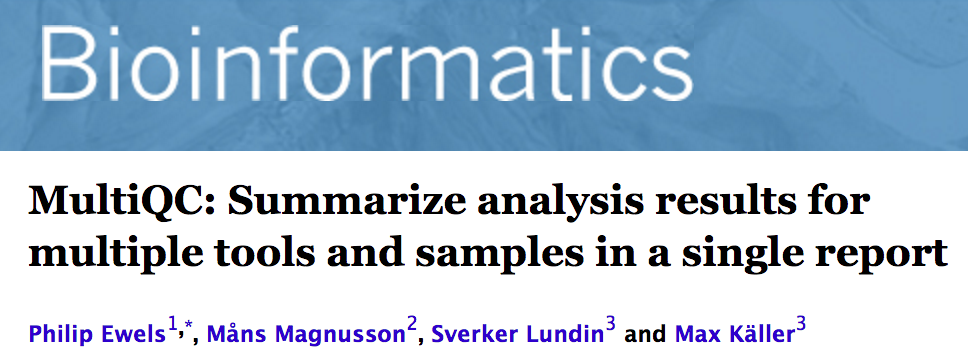MultiQC: Published!
I wrote a blog post about my latest tool, MultiQC, back in September. It has grown significantly since then and I’m glad to report that it’s just been published in Bioinformatics!
The publication of the paper seems like a good moment to take a step back and review how far the project has come. In the ten months or so since I started the project, MultiQC has quickly become an integral part of our workflows at the National Genomics Infrastructure in Stockholm. This alone is enough reason to spend the time writing the code, so it is especially rewarding when others can benefit from the work as well. The tool has quickly built momentum and is now being used by a number of groups and facilities. Notable mentions are its inclusion as standard in the bcbio tools and the contribution of several new modules by others in the community.
The project has been forked by 26 people on GitHub and starred by 65. There are eight other contributors listed on the project, which I think is a real testament to the success of open science! It’s difficult to know how many people are using MultiQC, but the website has had over 3000 different visitors and I’ve had bug reports and feature requests from people all over the world. Hopefully these numbers will continue to grow!
I’ve found it really interesting to see how news of the tool and publication spread. I’ve been using twitter more and more in the past year or so and it’s been fascinating to watch the organic spread of certain tweets. I tweeted about the MultiQC publication a couple of days ago and that tweet has racked up an impressive 42 retweets, with 3.2k impressions so far and 250 links clicked. This activity seems to come in waves, with popular twitter users retweeting followed by a short storm of activity. It has spread with terrifying speed too!
I’m sure that much of the success of MultiQC comes down to its ease of use and documentation. Having a dedicated website which makes it really clear what the tool does and how it works is critical. I find that maintaining detailed documentation is really useful for myself, and surely makes it more likely that others will contribute to a project.
Anyway, if you’d like to read more, you can find the new publication here:
MultiQC: Summarize analysis results for multiple tools and samples in a single report
Bioinformatics (2016)
Ewels P, Måns Magnusson, Sverker Lundin and Max Käller
doi: 10.1093/bioinformatics/btw354 PMID: 27312411
The main MultiQC website with documentation and walkthrough videos is at http://multiqc.info
